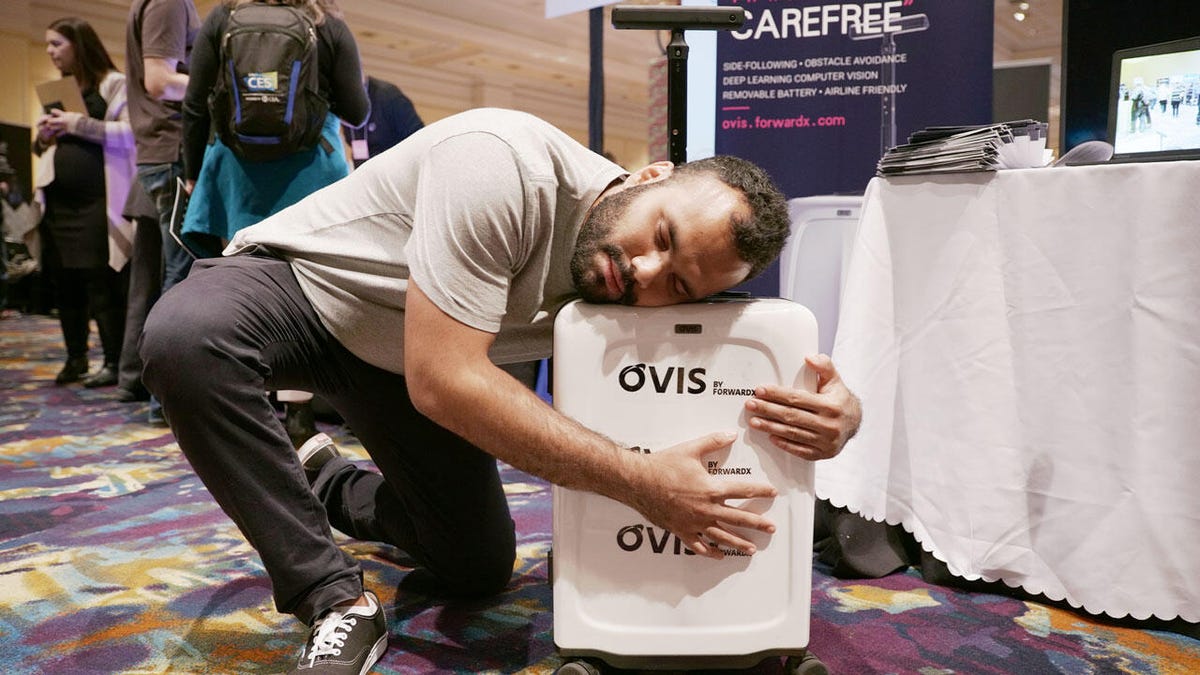Why my favorite thing from CES was this suitcase
Commentary: It's not the tech I want, it's the tech I need.
Imagine this. You're a tech journalist who lives in a far away land. You're covering CES , the world's biggest tech convention, for the first time ever, but you have to fly to Las Vegas to do it. You're nervous. It's a big week. You'll be in transit for 23 hours and have to beat jet lag by the time the show starts.
Now imagine, 20 hours into your trip to Vegas, you're at LAX airport. You walk into a store with your luggage, buy water and then realize, as you walk out of the store, you're traveling light. You walked away from your suitcase for a minute, and now it's gone. Lost to the world, or airport security, and with it 10 days worth of clothing plus a hearty chunk of your dignity.
You have to cover CES, but you have no clothes. Good times ahead.
Here's the kicker: On the first official day of CES, you walk into a show floor hall. You see the weird and the wonderful, from a Segway egg chair that looks like it came out of Wall-E to a preposterously high-tech vape. And among it all you spot Ovis, an AI-powered suitcase that, using five cameras in its handle, follows you wherever you go.
How do you feel?
I'll tell you how I felt, having gone through this exact sequence of events. Angry. Resentful. Sad. Hopeful about the future.
On my way to Vegas, I (stupidly) left my carry-on suitcase unattended in a store at LAX for 45 seconds. When I turned around it was gone. Had to spend $400 on clothes for CES week.
— Daniel Van Boom (@dvanboom) January 7, 2020
So imagine how I felt when I saw this - a suitcase that follows you #CES2020 pic.twitter.com/cQyimfyAMg
CES is a wild peek into 2020 and beyond, a show where you see an expansive spectrum of new tech. I saw a wall of 200 OLED LG displays that, showing off the company's curved-display technology, wrapped around the cave-like ceiling to form an oceanic wave of pixels. I saw two new laptops from Dell that will feature sumptuous folding displays. I saw a dutiful robot that brings you toilet paper when you run out.
But most of what I saw at CES was neither novel nor practical. The various show floors that make up CES are mostly filled with gadgets that range from unimaginative to completely useless. A lot of it reeks of solutions looking for a problem.
Take folding displays. They're having a moment right now, since folding phones and folding laptop screens look to be upcoming evolutions. But that means there are a bunch of companies jumping on the bandwagon, making things like a $900 speaker with a folding screen wrapped around it.
Which is why Ovis spoke to me. It is technology that aims to solve actual problems. A problem I'd actually encountered just two days earlier. Whether it's for those with accessibility issues, like people in wheelchairs, or forgetful dopes like myself, Ovis is a product that serves a specific purpose.
It comes with a wristband and, as mentioned, has five AI-powered cameras in its handle. It uses those cameras to identify and follow you. If you get more than 6 meters away (19 feet), the cameras won't be able to see you. To counter this, the wristband emits vibrations which the suitcase tracks and moves toward. Its batteries are removable, as is required by the Transportation Security Administration for travel. It's been at CES twice before in prototype form, but now it's ready for showtime.
And you know what else? It's really boring.
Were it not for my airport misadventures, I would have walked straight by Ovis and not given it a second thought. It does a particular job, and it's a banal one: Help you not lose your luggage. For the average person, getting excited over that is like getting excited about a new travel insurance scheme.
We naturally associate technology with paradigm shifts. Cars, computers, the internet and phones have changed the world, and we're always on the lookout for what that next world-changer is. But actually, a lot of the best technology exists to fix pedestrian, everyday problems.
Ovis isn't thrilling. It doesn't get you excited like, say, a Switch that played PC games. And it's far from perfect. It's $800, and though I tried it on the show floor, I can't be sure how well using it at an airport would look or feel.
But if I had an Ovis suitcase, I wouldn't be spending today emailing LAX's lost and found department about my luggage, and I wouldn't have had to spend $400 on clothing for the week. My life would be better. That's more than I can say about a lot of tech at CES.


